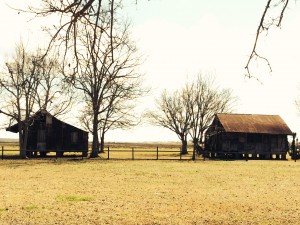In contrast to Chris and Esther, I don’t have any fancy photo equipment and no skills; I take pictures with my mobile device and the vast majority of them are crap. But here’s one I got attached to. I took it when I visited Laura Plantation in Lousiana (which was also the scene of this rather hilarious story). It’s very good that they preserved these slave cabins; if you enter them and you are told that two families lived in each of those huts, it makes it in a very accessible way possible to image/understand what their living conditions have been.
The plantation guide told us that when slavery was abolished, the owner started to pay the slaves, but at low wages, while making them pay a lot (in relative terms) for ‘board and lodging’. My understanding of this is that since the slaves had no savings or other means, they couldn’t go anywhere, and were in a certain sense forced to keep working in socio-economic circumstances that still had much in common with slavery.
Highly recommended to visit.
—-
* Sunday? OK, where I’m sitting right now it’s Saturday evening, but hey, it’s already Sunday in Australia, China, Indian, Vietnam, Japan, Indonesia, Pakistan etc etc.
